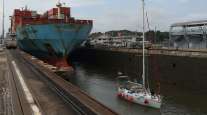Enforcement of Tanker Residue Rule Delayed as Carrier Industry, U.S. Customs Debate
This story appears in the May 16 print edition of Transport Topics.
U.S. Customs and Border Patrol officials have postponed the July 17 effective date for a controversial regulation requiring that motor carriers and exporters report even small amounts of residual chemicals left inside cargo tank containers when returning from deliveries in Canada and Mexico.
The regulation would require that carriers stipulate on electronic manifests the amount of residue in tanks crossing the border.
In an announcement earlier this month, the agency said it was postponing the effective date because the electronic technologies to document residues currently available in the truck and air modes of transport do not yet exist for rail tankers.
Although Customs did not set a new enforcement deadline, it said that it could begin as soon as early 2012, when it estimates the electronic technology also would become available for the rail industry.
The regulation is not restricted to hazardous materials or chemicals, but also includes products ranging from corn syrup and chocolates to nonhazardous resins.
“CBP anticipates establishing an enforcement date for all modes once the requisite information-technology issues are resolved,” the agency’s announcement said. “The trade community will be notified well in advance of the enforcement date once it is established.”
The agency has been postponing enforcement deadlines for the regulation since August 2009 (8-23-10, p. 3).
“The good news is that they have again delayed enforcement of this confusing requirement which will cause real disruption in the smooth flow of goods across the borders,” said John Conley, president of National Tank Truck Carriers. “We do appreciate that CBP is considering the concerns of industry as they develop their policy.”
Motor carriers and shippers have said the new requirement would force tank trucks returning to the United States to estimate the quantity and value of even the smallest remaining residue in a tank and include it on a full electronic manifest transmission to CBP.
Carriers said the requirement would delay the return of tractors, trailers and drivers to the United States, would interfere with exports, and could discourage U.S. haulers from providing tank services, according to trade groups for the trucking industry and hazardous-materials shippers.
As a result, members of a residue coalition that includes executives of the trucking, chemical, shipping, petroleum, rail and other industries have been meeting with CBP to seek a compromise over the agency’s regulation.
Richard Moskowitz, vice president and regulatory affairs counsel for American Trucking Associations, said the executives continue to work with CBP to establish an amendment that would eliminate the need for carriers to quantify the value and amount of all residue remaining in each container as it re-enters the country.
On behalf of the residue coalition, Moskowitz said ATA is proposing that the agency exempt the requirement for all residue that is below 3% of a container’s capacity.
Members of the coalition said that it’s nearly impossible for a tank truck to completely unload all of its content — unless it is thoroughly washed.
“We welcome this delay,” Moskowitz said. “There’s been significant back and forth between industry and CBP to work out a reasonable way to accomplish what CBP wants. But no final decisions have been made.”
The CBP requirement was developed after a 1994 exemption letter in which the agency told Dow Corning Corp. that it would not be required to declare residues when they re-entered the United States because they were considered “instruments of national trade.”
The industry mistakenly read the letter as a signal that the agency would no longer require the residue to be declared, CPB later said.
CPB, however, has said the letter pertains only to Dow and was not intended to be a guideline for the entire industry.




